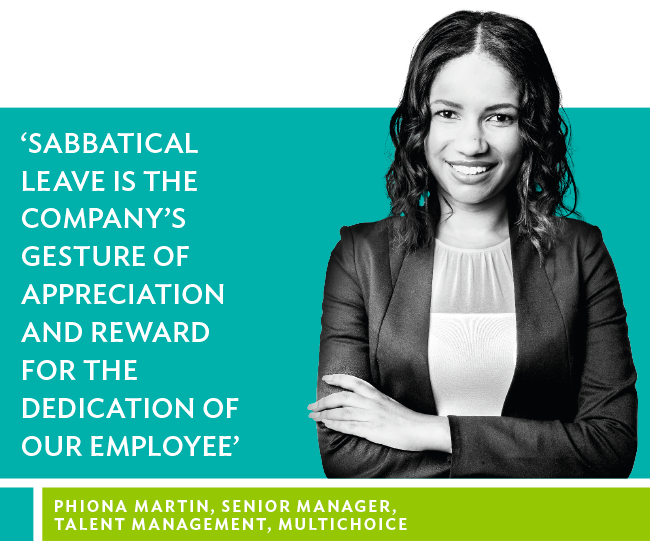It is probably the only time you envy your classmate who opted to collect dust in academia rather than embrace the risks and earn the rewards of a corporate career. Their car may be a decade old and their best suit even older, but they’ve just been given two years off work to read and reflect, and still get paid. Sabbatical leave is entrenched in the history of academia – a year or two to focus on rest, research and re-engaging with your discipline – while those in commerce are expected to recharge their batteries during 21 days’ annual leave.
But companies are increasingly recognising the value of the so-called ‘power sabbatical’ that allows senior employees to benefit from an extended time out and return to work refreshed. Prestigious firms such as Nike and Newsweek – and MultiChoice in SA – have made sabbaticals part of their policies to reward and ultimately retain staff, and let innovation and energy flow back into the business. Even companies that do not have a policy regarding sabbaticals are these days more likely to consider a valuable employee’s proposal for a mid-career break.
At MultiChoice, time out is preceded by a good deal of time served. ‘Our policy allows employees with 20 years of service to take three months’ paid sabbatical leave in their twenty-first year of employment with the company,’ says Phiona Martin, senior manager: talent management. ‘The general trend regarding employment tenure has changed, with millennials becoming the most populous group in the workplace – people are switching jobs and companies more frequently. We are, however, happy to still have individuals who have been with us from the beginning. Providing sabbatical leave is the company’s gesture of appreciation and reward for the dedication of our employees who serve a 20-year tenure,’ she says.
While the MultiChoice policy rewards long service with paid time off, elsewhere loyalty is losing its currency as a tool for career advancement. Employees are no longer staying in career-long jobs, writes Ben Reeve in an online post for the Sabbatical Guide, an online resource for anyone who longs for a break. More people are now ‘willing to take risks as they move through their life [and] getting used to moving between different companies’, which means employers have to come up with persuasive retention strategies to hold on to star performers. ‘Nine-to-five’ has given way to 24/7, says Reeve, and the growing demand for time out is part of a backlash against work gatecrashing everyone’s leisure time. The rise in remote working has also given people a taste of freedom, and of the value of having time for thinking.
Young people want their career to offer a meaningful experience, says Ivor Twydell, executive coach at UK consultancy Alquemy. ‘To have the experience of some time out to get a greater sense of who they are and what they want from life is essential if they are going to continue to be highly motivated. For those who do take a sabbatical it is because they realise they need to be able to step back, pause and take stock of where they are in life to be able to find a refreshed sense of purpose about who they are and where they are heading.’
As learning, flexible working and self-development become more important than promotions and retiring with a pension, demand for sabbaticals is growing, and more and more employers are forced to acknowledge that to retain valuable employees they may have to do without them for a while. A sabbatical doesn’t come without potential hazards. For the employer, there is the temporary disruption of teams and projects, and the risk that after a long absence, an employee may return a little rusty, says Scott Dobroski, senior director at job search-engine Glassdoor. That is if they come back at all. ‘A sabbatical, in part, is meant for someone to discover something new; learn new skills, get enriched in some way. And what if they like that option better?’
People are unlikely to take a sabbatical to maintain the status quo, says Reeve. ‘You are searching for something, looking for a new perspective on life, or trying to learning something new. You will replace your normal routine with something fresh, exciting and maybe even a little uncomfortable. Something that will burn off the haze surrounding everyday life, and let you see the bright lights of a new world.’
To minimise the risk that rather than bring those bright lights back to the business, the employee may vanish into the new world, it is advisable to draw up a written agreement about the terms of the sabbatical – whether it will be paid and whether benefits will be suspended – and the role the employee will return to. The agreement also protects the employee, who may be concerned about seeming replaceable, or losing out on opportunities for advancement. A sabbatical should be a business decision the employer and employee negotiate to their mutual advantage, with the benefits to each party identified and recognised in advance.
The MultiChoice policy requires three months’ notice before sabbatical leave to ensure a smooth handover and seamless transition, says Martin. But the risk to productivity is offset by opportunities. ‘Employees who go on sabbatical provide other employees the opportunity to temporarily step into their roles. This can help facilitate cross-training and exposure to new skills for the employees allocated to cover for the staff member on sabbatical.’
A temporary absence can also reveal weaknesses in the personnel structure. ‘As an employer, we have the opportunity to assess, during a sabbatical, if there is an over-reliance on a specific employee – particularly if it is hard for others to fill their shoes in their absence,’ says Martin. The desire to retain a top talent is the main reason an employer is likely to consider an application for a sabbatical, but there’s the advantage of your star performer returning with new focus and energy. ‘Stepping away for four months to think definitely refreshed my approach to my projects,’ says Liz Neate, who was allowed to pause her career at Deloitte to do voluntary work in Uganda. The feeling of returning to projects almost with new eyes ‘was really beneficial’, she says.
It is even more valuable when the lessons learnt during a sabbatical are shared with the rest of the team, says Tamara Schwarting, CEO of co-working community 1628 Ltd. ‘Document your sabbatical experience and be prepared to share it when you return to work,’ she writes on Forbes.com. Twydell concurs. ‘Sabbaticals benefit everyone in the team. For one of the team to return with a greater sense of ease, more motivated, clearer on where they are heading in life, more creative and innovative – how can that not be good for the team? Particularly if it is the team leader.’
So you’ve mentioned the possibility of a sabbatical to your company, and they have asked to see a proposal. Your pitch is about nurturing yourself, developing new skills and bringing fresh insights to the business, so festival-hopping or learning to play bass isn’t likely to go down well. A sabbatical is not a vacation; it is not simply ‘time off’, says Schwarting. ‘During my sabbatical periods, I have travelled to experience new cultures and spent time reconnecting with myself, family and friends. Most recently, I used a sabbatical to help a local non-profit with their organisational restructuring. Each time, I have come back to work recharged and with a better sense of myself. I am able to contribute more fully in my workplace and feel more confident of the direction of my career.’
Depending on your field, long-term travel, studying towards a professional qualification, honing work-related skills or even learning a new language may get the nod, but volunteering has broad appeal as a way to escape and re-evaluate where you are. Taking a sabbatical to make a difference is rooted in the origin of the word, says Reeve. ‘The word sabbatical has its origins in the word sabbath, meaning a day of rest. It is also used to refer to a sabbath year. This is the seventh year of the agricultural cycle set out by the Torah. In this sabbath year, the land is left to fallow so it has a chance to rest and the nutrients go back into the soil.’
If you are raring to take time off to build schools in Indonesia or work on a coffee farm in Guatemala but worried that it could derail your career, healthcare writer and editor John Rossheim offers the following tips on career-resources and job-search site Monster.com. Start by learning about your company’s sabbatical policy, then prepare an upbeat pitch about ‘what you want to do, why and when you’ll return’. Brainstorm how you will pay for your sabbatical, as extended leave is typically unpaid.
Finally, keep in touch while you’re away to make re-entry easier. And make sure you arrive with freshly honed skills, an attitude to match and a willingness to share. In fact, by sharing your experience, you may help normalise the practice.









